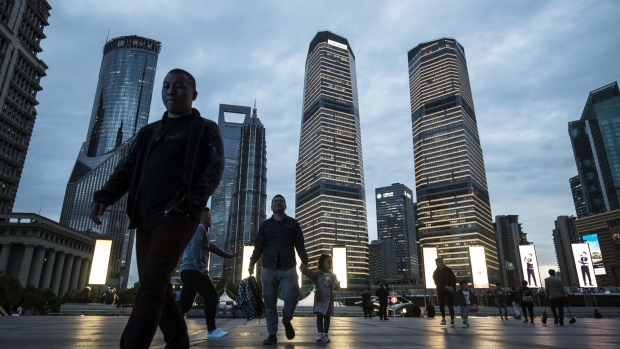Apr 18, 2019
Crisis at China's JPMorgan Wannabe Deepens With Bond Defaults
, Bloomberg News

(Bloomberg) -- A debt crisis at one of China’s most well-known private conglomerates entered a new stage Thursday, with the company saying cross-default clauses had been triggered on dollar bonds worth $800 million.
China Minsheng Investment Group Corp. has appointed Kirkland & Ellis as legal adviser, according to a Hong Kong stock exchange filing, which also noted that banks have set up a creditor’s committee to try to stabilize the company. The cross default comes after CMIG’s problems spread to its affiliate Yida China Holdings Ltd., making some of the developer’s debt immediately payable, and causing a chain reaction back to the parent company’s own securities.
CMIG’s dollar bonds due in August traded at around 40 cents on the dollar Thursday.
CMIG spooked investors with a late bond repayment earlier this year, joining other sprawling Chinese conglomerates such as HNA Group Co. in struggling to repay debt after a spending spree. Since its establishment in 2014, CMIG has spent more than $4 billion on investments and amassed about $35 billion of liabilities as of September.
CMIG said in the filing Thursday that it has also reached an agreement with holders of a privately placed note to extend the payment date to April 19 from April 8.
Yida China’s credit rating was cut to CCC from CCC+ at S&P Global Ratings late Thursday, saying the company may face a liquidity crunch in the next 12 months, given the overhang of debt repayable on demand. This may lead to a “liquidity crisis” should lenders immediately exercise such rights, the ratings company said in a statement.
Signs of stress appear to be spreading, despite a stabilizing economy. Citic Guoan Group Co., a state-linked conglomerate, was downgraded on Wednesday after fresh asset seizures, helping trigger a plunge in its listed unit’s shares. Tewoo Group earlier this month sought support from lenders to extend its debt as the Chinese commodities trading house faced a liquidity crunch.
CMIG is the brainchild of Dong Wenbiao, the former chairman of China’s largest non-state bank who’s known as the “godfather’’ of the nation’s private sector. Billing the company as a Chinese version of JPMorgan Chase & Co., Dong convinced 59 non-state companies to join forces as the company’s founding shareholders. The company’s funding eventually dried up as its investments struggled and shadow banks pulled back because of tighter regulation and slowing economic growth.
--With assistance from Tongjian Dong.
To contact the reporters on this story: Richard Frost in Hong Kong at rfrost4@bloomberg.net;Lianting Tu in Hong Kong at ltu4@bloomberg.net
To contact the editors responsible for this story: Sarah Wells at smcdonald23@bloomberg.net, Chan Tien Hin
©2019 Bloomberg L.P.